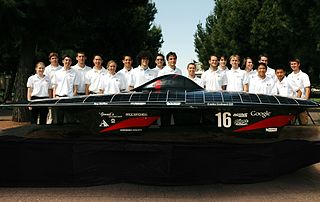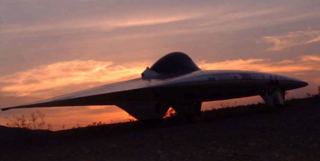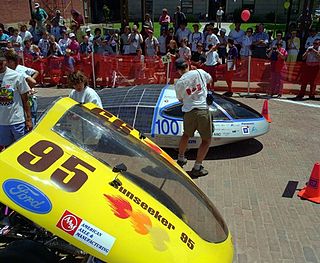
Nuna is the name of a series of manned solar powered race cars that have won the World Solar Challenge in Australia seven times: in 2001, 2003, 2005, 2007, 2013, 2015 and 2017. The vehicles are built by students who are part of the "Nuon Solar Team" at the Delft University of Technology in the Netherlands, sponsored by N.V. Nuon Energy.

The University of Calgary Solar Car Team is a multi-disciplinary student-run solar car racing ("raycing") team at the University of Calgary, based in Calgary, Alberta, Canada. It was established to design and build a solar car to compete internationally in the American Solar Challenge (ASC) and the World Solar Challenge (WSC). The team is primarily composed of undergraduate students studying Engineering, Business, Science, Arts and Kinesiology. The mission of the University of Calgary Solar Car Team is to educate the community about sustainable energy and to serve as an interdisciplinary project through which students and faculty from various departments can collaborate in supporting sustainable energy.

The Stanford Solar Car Project (SSCP) is a student group at Stanford University that designs, builds, tests, and races solar-powered vehicles. The SSCP, a student-run, donation-funded organization, has been building and racing solar-powered vehicles since 1986. The team's most recent car, Arctan, was unveiled in July 2015 and placed sixth in the Challenger Class of the 2015 World Solar Challenge. Previous cars have competed and placed at previous World Solar Challenges, the Global Green Challenge, and American Solar Challenge.

The UNSW Solar Racing Team is the solar car racing team of the University of New South Wales in Sydney, Australia. The team currently holds a number of world records and is best known for its participation in the World Solar Challenge (WSC). Since its founding in 1996 by Byron Kennedy, the Sunswift team has built a total of 6 different cars, the most recent of which is Sunswift VI.

The University of Minnesota Solar Vehicle Project, or UMNSVP, is a team of undergraduate students from the University of Minnesota that designs and constructs solar-powered cars. In its 28 years, it has established itself as one of the world's top solar racing teams, and the top Cruiser/MOV team in the Western Hemisphere, with top-two finishes in eighteen of thirty-three events entered.

McGill University's Solar Car Team was composed of students from the faculties of Engineering and Computer Science. From 1990 - 2010, the team designed, built, tested and raced 3 generations of solar vehicles in international competitions. Under the brand Team iSun, the team placed 9th in the 2003 American Solar Challenge from Chicago to Los Angeles, and notably produced the lighest solar vehicle in the competition at 318 lbs. Through the production and racing of solar vehicles, the students on the team learn and exercise teamwork, personal initiative, and responsibility - not only in the engineering disciplines of design and analysis, but also in construction, marketing, project management, and promotion. Team members make an effort to promote engineering and computer science careers in their frequent meetings with elementary school, high school, and CEGEP students.

Durham University Electric Motorsport (DUEM) is a student-run team in the United Kingdom that designs and constructs solar powered cars to compete in international competitions. DUEM is the longest running solar car team in the UK and is financed entirely by third party donations and sponsorship.

The Sunraycer was a solar powered race car designed to compete in the world's first race featuring solar-powered cars. This race is now called the World Solar Challenge. The Sunraycer, a joint collaboration between General Motors, AeroVironment, and Hughes Aircraft, won the first race in 1987 by a huge margin. The teams lead driver was Australian John Harvey, a driver with nearly 40 years experience racing speedcars (Speedway), open wheelers, sports cars and touring cars. Harvey was involved with the testing and development of the Sunraycer at the General Motors Proving Ground, Arizona.

The 1993 Maize & Blue solar car was built by the University of Michigan Solar Car Team during the period from 1990 to 1993.

A solar car is a solar vehicle used for land transport. Solar cars usually run on only power from the sun, although some models will supplement that power using a battery, or use solar panels to recharge batteries or run auxiliary systems for a car that mainly uses battery power.
Solar car racing refers to competitive races of electric vehicles which are powered by solar energy obtained from solar panels on the surface of the car. The first solar car race was the Tour de Sol in 1985 which led to several similar races in Europe, US and Australia. Such challenges are often entered by universities to develop their students' engineering and technological skills, but many business corporations have entered competitions in the past. A small number of high school teams participate in solar car races designed exclusively for high school students.
The SunStang Solar Car Project is a non-profit, student-run mega project at the University of Western Ontario (UWO) that participates in international solar races, most notably the World Solar Challenge and the North American Solar Challenge. The team consists of undergraduate and graduate students from faculties as varied as Engineering, Social Sciences, and the Ivey School of Business. Funding comes from industry sponsors and personal donations, as well as support from UWO. It is the largest budgeted mega-project of the Faculty of Engineering at UWO, close to $300,000 in 2007, including race expenditures. SunStang's directive is to foster a team environment where, through active participation and mentorship, students are able to learn and apply skills useful not only for the construction of a solar vehicle, but also for the benefit of personal and mutual growth and development.
The Cal State LA Solar Car Team is an engineering team from California State University, Los Angeles. The team develops the Solar Eagle, a series of solar cars that have taken part in solar car races in the United States and in Australia.

The Sunseeker Solar Car Project, Sunseeker for short, is Western Michigan University's solar car team. Each vehicle is designed, built, maintained, and raced by students. Sunseeker has competed in all of the American Solar Challenge events, going back to 1990.
Aquila Racing Cars is a race car manufacturer from Denmark.

Blue Sky Solar Racing is a student-run initiative at the University of Toronto. The team aims to promote environmentally friendly technologies through the design, construction and showcasing of world class solar powered vehicles. The project encourages students to participate in a long-term multidisciplinary project to augment their skills learned in class, and to make a positive impact on their community.

The Mizzou Hydrogen Car Team designs, builds and competes with an Urban Concept hydrogen fuel cell vehicle run by students at the University of Missouri in Columbia, Missouri. They recently competed with their vehicle named "Tigergen III" in the 2013 Shell Eco-Marathon. At the competition they achieved 8.8 mi/kWh which placed them 3rd in the UrbanConcept Hydrogen category. The team also won an off-track award for "Best Team Spirit"

In the late 1990s, the successful Tuscan Challenge race series was in need of updating and Peter Wheeler began the project that would fulfill his ambition to see TVRs at Le Mans. Work began on a completely new racing car that would be built using modern composites, be more rigid than any previous TVR and be CAD designed to reach speeds in excess of 200 mph (322 km/h) and be stable. The car itself would be a steel tubular frame with full roll cage forming the backbone to a full carbon fibre monocoque.
SolarMobil Manipal is the official Solar Car student team of Manipal University, Manipal. The team, founded in 2011 by a group of engineering students of Manipal Institute of Technology, is the third Indian solar car team and the first Indian team to build a passenger solar car. SolarMobil is a student project aimed at research & development of solar powered electric vehicle.

















